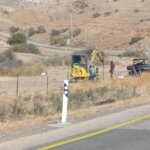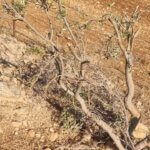New Israeli Colony in Abu al Ajaj
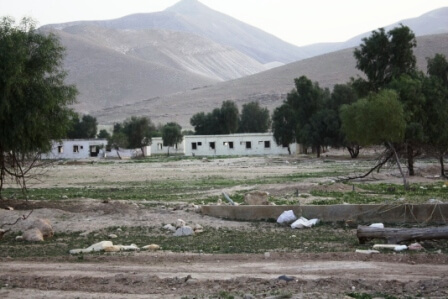 Israeli settlers are establishing yet another new colony in the Jordan Valley. With the support of the Israeli Prime Minister, Netanyahu, they are taking over a disused army base close to two Palestinian communities and claiming the land for themselves, just as the notorious Maskiyyot settlers did in 2002.
Israeli settlers are establishing yet another new colony in the Jordan Valley. With the support of the Israeli Prime Minister, Netanyahu, they are taking over a disused army base close to two Palestinian communities and claiming the land for themselves, just as the notorious Maskiyyot settlers did in 2002.
In recent weeks the settlers’ contractors have started to renovate the buildings of the disused Gadi military base, in the Abel al Ajaaj area of Al Jiftlik village, in the heart of the Jordan Valley. These new colonialists are clearly working closely with the settlement run ‘Jordan Valley Regional Council’ and the neighbouring settlement of Massu’a. One of the most aggressive colonies in the Jordan Valley, Massu’a settlers are responsible for a series of land grabs whereby they have violently stolen land from Abel al Ajaaj on three separate occasions in recent years.
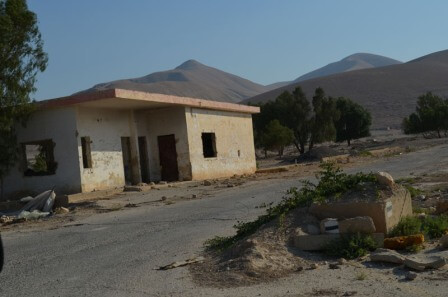 The establishment of a new settlement was announced on Israeli Army Radio on 10th March 2011, when Netanyahu visited Gadi base. At the time David Alhiani, head of the Jordan Valley Regional Council, said:“Neither the defense minister nor the prime minister will build a new settlement in the Jordan Valley, not now. Maybe later, when there’s sovereignty in the valley”.
The establishment of a new settlement was announced on Israeli Army Radio on 10th March 2011, when Netanyahu visited Gadi base. At the time David Alhiani, head of the Jordan Valley Regional Council, said:“Neither the defense minister nor the prime minister will build a new settlement in the Jordan Valley, not now. Maybe later, when there’s sovereignty in the valley”.
Israel doesn’t have sovereignty of the Jordan Valley today, any more than they had a year ago. Their occupation is just as illegal as it was a year ago. But their attempts to take over the valley have become more aggressive and transparent. Thus, in September 2011 news broke of Israel’s plans to embark on the systematic removal of 27,000 Bedouin from East Jerusalem, the Jordan Valley, and the rest of Area C.
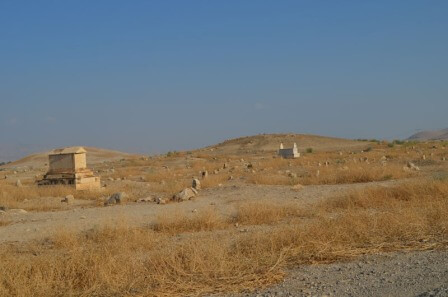 It has been reported that the new settlement will be run by the Israeli Bnei Hamoshavim youth organisation, and will specifically encourage young Israeli’s who have experienced poor mental health or addiction, to join in the Jordan Valley colonisation project.
It has been reported that the new settlement will be run by the Israeli Bnei Hamoshavim youth organisation, and will specifically encourage young Israeli’s who have experienced poor mental health or addiction, to join in the Jordan Valley colonisation project.
Prior to Israel’s occupation of the West Bank in 1967 the Gadi military base was used by the Jordanian army, and around 10,000 Palestinians lived to the south and east in Abel al Ajaaj refugee camp. All that remains of the refugee camp today are the cemetery and the UNWRA school. The mosque still stands on the hill, within the fence surrounding the new IOF (Israeli Occupation Force) base, and Palestinians have been prevented from using it for the last 45 years.
Since the refugee camp was destroyed, soon after the occupation, the Palestinian community of Abel al Ajaaj has eked out a living by farming a little land and grazing their sheep on the hillsides. There are around 120 families now living in the community, some originally from the Al Jiftlik area, and others who came as refugees from Yata’ near Hebron, when they were driven out by the settler’s there.
 Over the last eight yearsthe settlers of the nearby Massu’a settlement have worked hand-in-hand with the IOFto attempt the drive the Palestinians from the land. On three separate occasions (in 2004, 2008 and 2010) they have selected an area of land that they want, removed any Palestinian buildings or possessions that were there, and taken the land for their own use: They erected greenhouses to cultivate grapes in 2004, took a field to grow their crops in 2008, and in 2010 attacked local Palestinians when they came and fenced off yet more land, and later erected another row of greenhouses. See UN OCHA Humanitarian Report . On each occasion the IOF stood by and supported them. During the same period the community have received countless demolition orders, and subjected to dawn raids, with many of their homes and animal shelters being demolished and destroyed by the IOF.
Over the last eight yearsthe settlers of the nearby Massu’a settlement have worked hand-in-hand with the IOFto attempt the drive the Palestinians from the land. On three separate occasions (in 2004, 2008 and 2010) they have selected an area of land that they want, removed any Palestinian buildings or possessions that were there, and taken the land for their own use: They erected greenhouses to cultivate grapes in 2004, took a field to grow their crops in 2008, and in 2010 attacked local Palestinians when they came and fenced off yet more land, and later erected another row of greenhouses. See UN OCHA Humanitarian Report . On each occasion the IOF stood by and supported them. During the same period the community have received countless demolition orders, and subjected to dawn raids, with many of their homes and animal shelters being demolished and destroyed by the IOF.
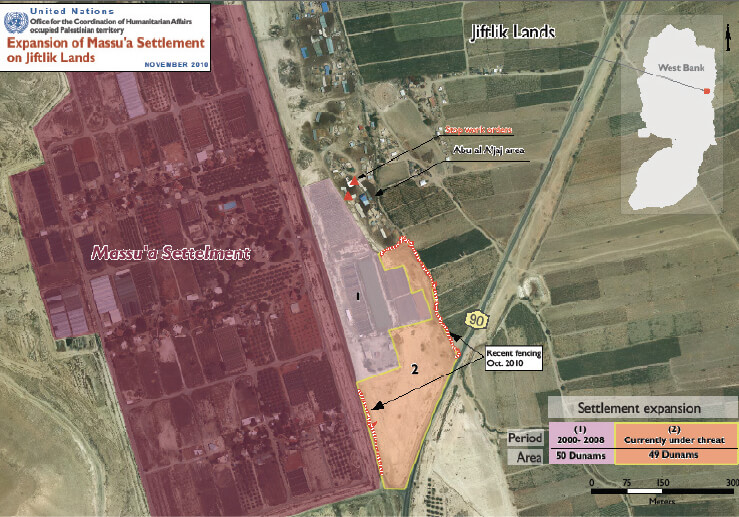 There are around 30 homes that have had demolition orders served against them. The families live with the fear that one day the IOF will arrive, and it will be their turn to have their home and livelihood destroyed. They have had their water pipes destroyed, their animals killed, and their access to grazing land stopped, and their land stolen in front of their eyes.
There are around 30 homes that have had demolition orders served against them. The families live with the fear that one day the IOF will arrive, and it will be their turn to have their home and livelihood destroyed. They have had their water pipes destroyed, their animals killed, and their access to grazing land stopped, and their land stolen in front of their eyes.
Other local farmers have also been harassed by the IOF. Waleed Abu Hania, living near the cemetery, has been uprooted from his farm three times by the IOF, each time attempting to claim that he’s using state land! A little further up the road, the Saaidh family have received a demolition order for the metal shipping container on their small farm of date trees.
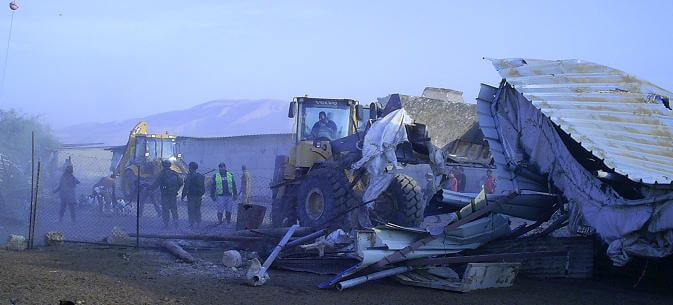 The small nearby community of Koursiliyya, comprised of four families, is even more vulnerable. Tucked away in the valley to the west of Gadi military base, they have already been stopped from accessing water from a small nearby natural spring, and are under threat of forced transfer.
The small nearby community of Koursiliyya, comprised of four families, is even more vulnerable. Tucked away in the valley to the west of Gadi military base, they have already been stopped from accessing water from a small nearby natural spring, and are under threat of forced transfer.
All these Palestinian families are continuing to live on their land against the odds. They are showing a steadfastness beyond belief, but also have nowhere else to go. This is their home. They are facing the concerted effort of the Israeli state to forcibly remove them from their land, and have experienced verbal abuse and physical assault from the illegal settlers from Massu’a. Now they face the prospect of another group of young settlers, given impunity by their government to use violence, aggression and harassment against their Palestinian neighbours.

